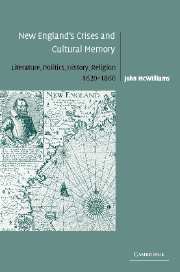Introduction: Crisis rhetoric: exclusion in New England history
Published online by Cambridge University Press: 22 September 2009
Summary
First, the inevitable question about a well-traveled road. Why, in a time of cultural studies that assimilate race and gender criticism, should anyone write yet another book centering on the Anglo-protestant northeastern writers, mostly male, who seem to comprise that regrettably inescapable term “Puritanism”? The field would seem to be as overworked, as exhausted, as a New England upland farm during the 1890s. One undeniable rejoinder would be that, since Vernon Parrington launched this academic complaint in the 1920s, hundreds of scholarly books on New England Puritanism and its authorial galaxy have testified to the lasting importance of the tradition. Nor has Puritanism remained a dead letter, recalled only in scarlet, in twentieth-century literature. The famed title of Santayana's novel notwithstanding, we are perennially ready to entertain yet another rediscovery of “the last Puritan,” whether in the guise of T. S. Eliot's assimilation of his New England roots to his Anglican present (Four Quartets), Robert Lowell's decidedly protestant Catholicism (Lord Weary's Castle), John Updike's witty broodings on sin and sexuality in New England suburbia (Couples), or Donald Hall's up-country generational pastoralism (String too Short to be Saved). The overhasty foreclosure of George Bancroft's insistence that Samuel Adams had been “the last Puritan” in America has been demonstrated again and again.
The lasting power and sheer volume of New England literary tradition, from William Bradford's History and John Winthrop's Journal onward, surely originate in the Puritan faith in the power and authenticity of the written word.
- Type
- Chapter
- Information
- New England's Crises and Cultural MemoryLiterature, Politics, History, Religion, 1620–1860, pp. 1 - 20Publisher: Cambridge University PressPrint publication year: 2004



